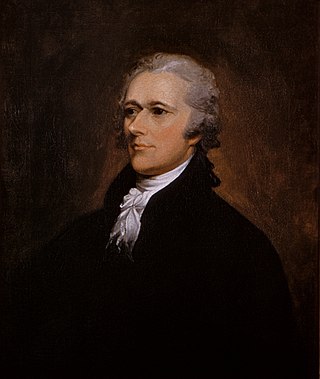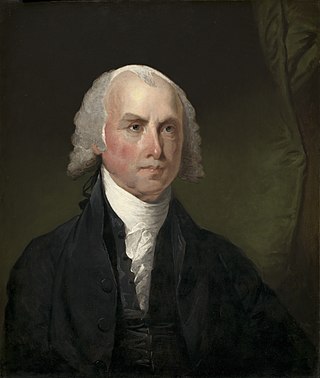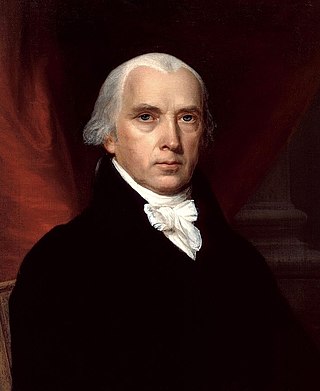
Article One of the Constitution of the United States establishes the legislative branch of the federal government, the United States Congress. Under Article One, Congress is a bicameral legislature consisting of the House of Representatives and the Senate. Article One grants Congress various enumerated powers and the ability to pass laws "necessary and proper" to carry out those powers. Article One also establishes the procedures for passing a bill and places various limits on the powers of Congress and the states from abusing their powers.

The Federalist Papers is a collection of 85 articles and essays written by Alexander Hamilton, James Madison, and John Jay under the collective pseudonym "Publius" to promote the ratification of the Constitution of the United States. The collection was commonly known as The Federalist until the name The Federalist Papers emerged in the twentieth century.

Anti-Federalism was a late-18th-century political movement that opposed the creation of a stronger U.S. federal government and which later opposed the ratification of the 1787 Constitution. The previous constitution, called the Articles of Confederation and Perpetual Union, gave state governments more authority. Led by Patrick Henry of Virginia, Anti-Federalists worried, among other things, that the position of president, then a novelty, might evolve into a monarchy. Though the Constitution was ratified and supplanted the Articles of Confederation, Anti-Federalist influence helped lead to the passage of the Bill of Rights.

Federalist No. 78 is an essay by Alexander Hamilton, the seventy-eighth of The Federalist Papers. Like all of The Federalist papers, it was published under the pseudonym Publius.

Federalist No. 14 is an essay by James Madison titled "Objections to the Proposed Constitution From Extent of Territory Answered". This essay is the fourteenth of The Federalist Papers. It was first published in The New York Packet on November 30, 1787 under the pseudonym Publius, the name under which all The Federalist papers were published. It addresses a major objection of the Anti-Federalists to the proposed United States Constitution: that the sheer size of the United States would make it impossible to govern justly as a single country. Madison touched on this issue in Federalist No. 10 and returns to it in this essay.

Federalist No. 26, titled "The Idea of Restraining the Legislative Authority in Regard to the Common Defense Considered", is an essay written by Alexander Hamilton as the twenty-sixth of The Federalist Papers. It was published on December 22, 1787, under the pseudonym Publius, the name under which all The Federalist papers were published. Federalist No. 26 expands upon the arguments of a federal military Hamilton made in No. 24 and No. 25, and it is directly continued in No. 27 and No. 28.

Federalist No. 64, titled "The Power of the Senate", is an essay first published in The New York Packet on March 5, 1788, by John Jay as part of the ongoing Federalist Papers. Throughout the Federalist Papers, James Madison, Alexander Hamilton, and Jay emphasize the particular role in the field of foreign affairs (Golove). However, Federalist No. 64 specifically focuses more deeply on the concept of treaties and how they are formed. This essay in the Federalist Papers is very influential, discussing the idea of treaties, the mystery behind the author, and the invalidity of the Anti-Federalists' argument.

Federalist No. 41, titled "General View of the Powers Conferred by the Constitution", is an essay written by James Madison as the forty-first of The Federalist Papers. These essays were published by Alexander Hamilton, with John Jay and James Madison serving as co-authors, under the pseudonym "Publius." No. 41 was first published by The New York Packet on January 19, 1788 and argues about the necessity of the powers the Constitution vested upon the general government as well as the meaning of the phrase "general welfare".

Federalist No. 49 is an essay by James Madison, the forty-ninth of The Federalist Papers. It was first published by The New York Packet on February 2, 1788, under the pseudonym "Publius", the name under which all The Federalist papers were published. It is titled "Method of Guarding Against the Encroachments of Any One Department of Government by Appealing to the People Through a Convention".

Federalist Paper No. 54 is an essay by James Madison, the fifty-fourth of The Federalist Papers. It was first published by The New York Packet on February 12, 1788 under the pseudonym Publius, the name under which all The Federalist papers were published.

Federalist No. 55 is an essay by James Madison, the fifty-fifth of The Federalist Papers. It was first published by The New York Packet on February 13, 1788 under the pseudonym Publius, the name under which all The Federalist Papers were published. It is titled "The Total Number of House of Representatives". It is the first of four papers defending the number of members in the House of Representatives against the critics who believe the number of members to be inadequate. The critics presume that there aren't enough representatives to defend the country against the small group of legislators who are violating the rights of the people. In this paper, Madison examines the size of the United States House of Representatives.

Federalist No. 57 is an essay by James Madison, the fifty-seventh of The Federalist Papers. It was first published by The New York Packet on February 19, 1788, under the pseudonym Publius, the name under which all The Federalist papers were published. It is titled "The Alleged Tendency of the New Plan to Elevate the Few at the Expense of the Many".

Federalist No. 59 is an essay by Alexander Hamilton, the fifty-ninth of The Federalist Papers. It was first published by The New York Packet on February 22, 1788, under the pseudonym Publius, the name under which all The Federalist Papers were published. This is the first of three papers discussing the power of Congress over the election of its own members, the other two papers in this series being Federalist No. 60 and Federalist No. 61. The title of the paper is "Concerning the Power of Congress to Regulate the Election of Members".

Federalist No. 62 is an essay written by James Madison as the sixty-second of The Federalist Papers, a series of essays initiated by Alexander Hamilton arguing for the ratification of the United States Constitution. It was first published in The New York Packet on February 27, 1788, under the pseudonym Publius. Federalist No. 62 is the first of two essays by Madison detailing, and seeking to justify, the organization of the United States Senate, and is titled "The Senate".

Federalist No. 66 is an essay by Alexander Hamilton, the sixty-sixth of The Federalist Papers. It was published on March 8, 1788, under the pseudonym Publius, the name under which all The Federalist papers were published. The title is "Objections to the Power of the Senate To Set as a Court for Impeachments Further Considered".

Federalist No. 68 is the 68th essay of The Federalist Papers, and was published on March 12, 1788. It was probably written by Alexander Hamilton under the pseudonym "Publius", the name under which all of the Federalist Papers were published. Since all of them were written under this pseudonym, who wrote what cannot be verified with certainty. Titled "The Mode of Electing the President", No. 68 describes a perspective on the process selecting the chief executive of the United States. In this essay, the author sought to convince the people of New York of the merits of the proposed constitution. Number 68 is the second in a series of 11 essays discussing the powers and limitations of the executive branch and the only one to describe the method of selecting the president.

Federalist No. 75 is an essay by Alexander Hamilton and seventy-fifth in the series of The Federalist Papers. It was published on March 26, 1788 under the pseudonym Publius, the name under which all The Federalist papers were published. Its title is "The Treaty Making Power of the Executive", and it is the ninth in a series of 11 essays discussing the powers and limitations of the Executive branch.

Federalist No. 76, written by Alexander Hamilton, was published on April 1, 1788. The Federalist Papers are a series of eighty-five essays written to urge the ratification of the United States Constitution. These letters were written by Alexander Hamilton, James Madison, and John Jay under the name of Publius in the late 1780s. This paper discusses the arrangement of the power of appointment and the system of checks and balances. The title is "The Appointing Power of the Executive", and is the tenth in a series of 11 essays discussing the powers and limitations of the Executive branch. There are three options for entrusting power: a single individual, a select congregation, or an individual with the unanimity of the assembly. Hamilton supported bestowing the president with the nominating power but the ratifying power would be granted to the senate in order to have a process with the least bias.

Federalist No. 80 is an essay by Alexander Hamilton, the eightieth of The Federalist Papers. It was published on June 21, 1788 under the pseudonym Publius, the name under which all The Federalist papers were published. It is titled "The Powers of the Judiciary", and it is the third in a series of six essays discussing the powers and limitations of the judicial branch.

James Madison was an American statesman, diplomat, and Founding Father who served as the 4th president of the United States from 1809 to 1817. He is hailed as the "Father of the Constitution" for his pivotal role in drafting and promoting the Constitution of the United States and the Bill of Rights. Disillusioned by the weak national government established by the Articles of Confederation, he helped organize the Constitutional Convention, which produced a new constitution. Madison's Virginia Plan served as the basis for the Constitutional Convention's deliberations, and he was one of the most influential individuals at the convention. He became one of the leaders in the movement to ratify the Constitution, and he joined with Alexander Hamilton and John Jay in writing The Federalist Papers, a series of pro-ratification essays that was one of the most influential works of political science in American history.








